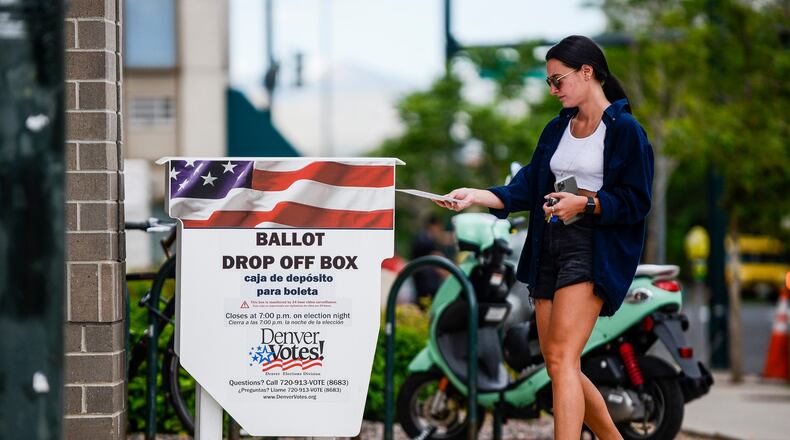By moving the All-Star game to Colorado, Major League Baseball on Tuesday chose a state known for voting access after abandoning Georgia over its new election law.
Georgia doesn’t provide the same kind of voting options as Colorado, where widespread voting by mail contributed to high turnout.
The midsummer celebration of the sport was relocated to Colorado in response to Georgia’s voting law passed by the state’s majority-Republican General Assembly. MLB Commissioner Rob Manfred said last week that the league “opposes restrictions to the ballot box” and would move the game and associated festivities, such as the Home Run Derby.
Colorado, a Democratic-controlled state, automatically mails ballots to all registered voters before each election, one of five states with a vote-by-mail system. By comparison, Georgia’s election law prohibits governments from sending unsolicited absentee ballot applications to voters.
Colorado offers vote centers for those who don’t want to cast ballots by mail. Vote centers are open for 15 days and available to all registered voters in their county, regardless of their home address. Under Georgia’s voting law, provisional ballots cast outside a voter’s home precinct won’t be counted, and 17 days of in-person early voting are required statewide before general elections.
Ballot drop boxes are available 24 hours a day with a video surveillance system in Colorado, similar to the drop boxes Georgia permitted last year amid the coronavirus pandemic. Georgia’s voting law now limits the usefulness of drop boxes, only allowing them inside early voting locations and available only during voting hours.
Election officials in Colorado verify mailed ballots based on voter signatures, as Georgia did in previous years. In future elections, Georgia will check absentee ballots based on driver’s license numbers, state ID numbers or other documentation instead of signatures.
Colorado also allows voters to register through election day, enabling them to vote in person immediately. Georgia has one of the earliest voter registration deadlines in the country, requiring new voters to sign up 29 days before election day.
In all, Colorado’s election laws emphasize voter accessibility while Georgia’s laws require more effort from voters.
“I wish Georgia would move in the other direction,” said state Rep. Mary Frances Williams, a Democrat from Marietta whose district is near the Atlanta Braves’ stadium. “Voting is a right, and I don’t at all understand making people jump through hoops to vote. I don’t get it.”
But supporters of Georgia’s voting laws say they’re better than Colorado’s, offering two more days of in-person early voting, four more days of mail-in voting, optional Sunday voting and free voter ID cards.
Republican Gov. Brian Kemp said Georgia’s laws help ensure that only eligible voters are able to cast ballots, and he blamed MLB for “caving” to liberals.
“For those who are keeping track, Georgia has 17 days of early voting. Colorado has 15. When it comes to cancel culture, facts don’t matter,” Kemp wrote on Twitter on Tuesday.
Turnout in Colorado was the second-highest in the nation in the presidential election, with 76% of the voting-eligible population casting ballots, trailing only Minnesota, according to the United States Election Project.
In Georgia, 68% of eligible voters participated in the general election, the 26th-highest turnout in the nation.
About the Author
Keep Reading
The Latest
Featured




